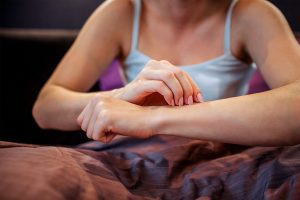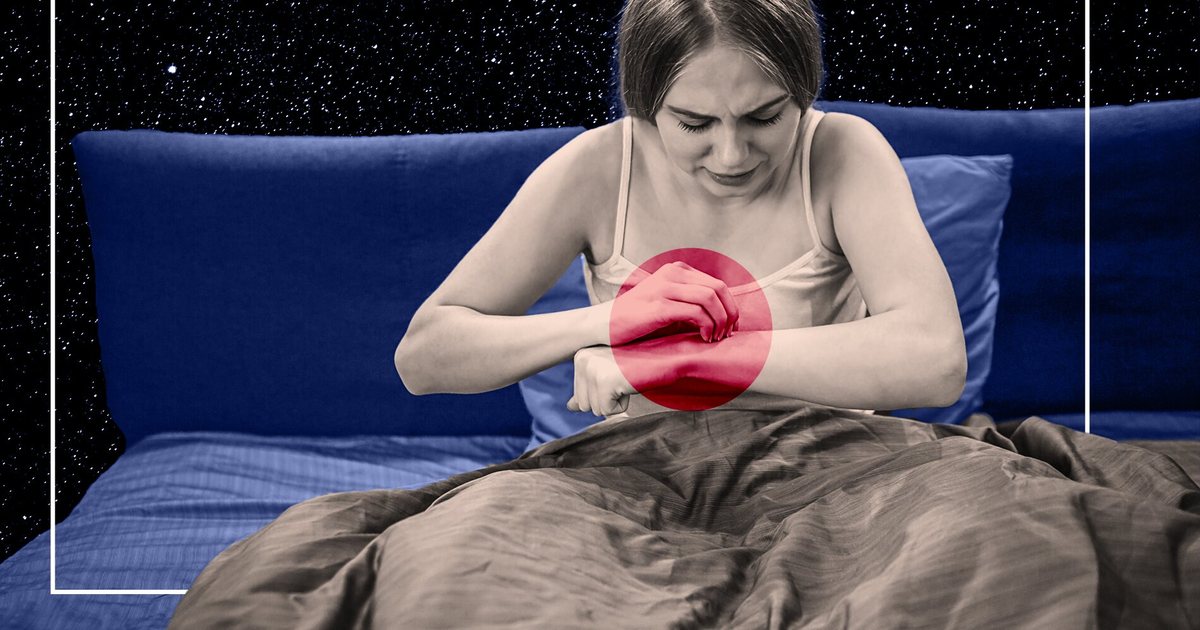Introduction
Late-night itchiness can be a bothersome and uncomfortable experience, disrupting sleep and affecting overall well-being. Understanding the underlying causes of this phenomenon is crucial in finding effective solutions to alleviate symptoms and improve skin health. In this comprehensive guide, we delve into the various factors contributing to late-night itchiness and explore strategies to combat it for a more restful night’s sleep. Explore More About (Eye Twitching)
Understanding Late-Night Itchiness
Late-night itchiness, also known as nocturnal pruritus, refers to the sensation of itching that occurs predominantly during the evening or nighttime hours. While occasional itching may be normal, persistent or severe itchiness can indicate an underlying issue that requires attention.

Common Causes
Several factors can contribute to late-night itchiness, including:
Dry Skin
One of the primary culprits behind evening itchiness is dry skin. As the day progresses, environmental factors such as low humidity levels and prolonged exposure to heated indoor spaces can deplete the skin’s natural moisture, leading to dryness and irritation.
Allergens and Irritants
Exposure to allergens and irritants, such as dust mites, pet dander, or harsh chemicals in skincare products, can trigger allergic reactions or irritation, resulting in itchiness, particularly during the evening when allergen exposure may be higher.
Skin Conditions
Certain skin conditions, such as eczema, psoriasis, and dermatitis, are characterized by inflammation and itching. These conditions often exhibit exacerbations during the evening hours, potentially due to changes in temperature and humidity levels.
Psychological Factors
In addition to physical causes, psychological factors can also contribute to late-night itchiness. Stress, anxiety, and poor sleep quality can exacerbate itching symptoms, creating a cycle of discomfort and sleep disturbances.

Effective Strategies for Relief
Addressing late-night itchiness requires a multifaceted approach targeting both the underlying causes and symptom management. Here are some effective strategies to alleviate evening skin irritation:
1. Moisturize Regularly
Maintaining proper skin hydration is essential for preventing dryness and itchiness. Regular moisturization with a hydrating lotion or cream can help replenish the skin’s moisture barrier and alleviate itching symptoms.
2. Identify and Avoid Triggers
Identifying and avoiding potential triggers, such as allergens or irritants, can help minimize itching episodes. Consider using hypoallergenic skincare products and implementing dust mite barriers in the bedroom to reduce exposure to common allergens.
3. Practice Good Sleep Hygiene
Establishing a bedtime routine and practicing good sleep hygiene can promote restful sleep and reduce stress levels, which may help alleviate itching symptoms. Create a relaxing environment conducive to sleep, and avoid stimulants such as caffeine or electronics before bedtime.

4. Seek Medical Evaluation
If late-night itchiness persists despite self-care measures, it’s essential to seek medical evaluation from a dermatologist or healthcare professional. They can assess your symptoms, diagnose any underlying skin conditions, and recommend appropriate treatment options, such as prescription medications or topical therapies.
5. Consider Alternative Therapies
In addition to conventional treatments, certain alternative therapies may offer relief from late-night itchiness. Natural remedies such as oatmeal baths, cold compresses, or soothing herbal teas may help soothe irritated skin and promote relaxation.
Conventional vs. Alternative Therapies
| Conventional Therapies | Alternative Therapies |
|---|---|
| Prescription medications | Natural remedies |
| Topical therapies | Oatmeal baths |
| Moisturizing creams and lotions | Cold compresses |
| Allergen avoidance | Herbal teas |
Conclusion
Late-night itchiness can significantly impact quality of life, affecting sleep and overall well-being. By understanding the underlying causes and implementing effective strategies for relief, individuals can minimize itching symptoms and enjoy a more restful night’s sleep. Prioritizing proper skincare, identifying triggers, practicing good sleep hygiene, seeking medical evaluation when needed, and exploring alternative therapies can all contribute to managing evening skin irritation effectively.
In summary, addressing late-night itchiness requires a comprehensive approach that addresses both the physical and psychological aspects of the condition. By incorporating these strategies into your daily routine, you can take proactive steps towards achieving healthier, itch-free skin and a better night’s sleep.




